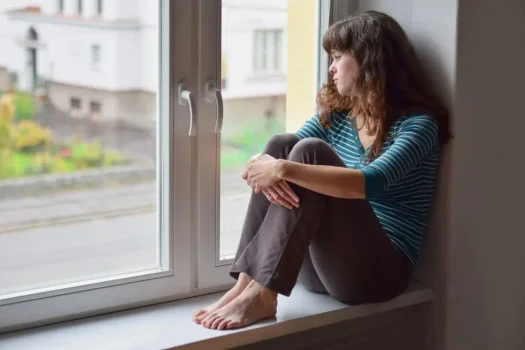In recent years, feelings of isolation have surged, impacting the mental health of millions of people worldwide. The COVID-19 pandemic, with its multiple waves of lockdowns and social distancing, magnified these feelings, creating a profound impact on individuals already grappling with anxiety and related conditions. Understanding the complicated relationship between isolation and anxiety is crucial for developing strategies to mitigate their combined effects.
Mental health professionals recommend strategies such as regular physical activity, mindfulness practices, and creative activities such as painting or drawing to help cope with feelings of loneliness and anxiety. Additionally, talking to family and friends and engaging in meaningful group activities can help create a sense of connection and comfort.
Defining Social Isolation: A Closer Look
Social isolation is more than the absence of physical contact with others; it encompasses a deep sense of disconnection from others even when someone is regularly around other people. It can manifest in various forms, from physically isolating oneself to feeling misunderstood or excluded even in a crowd. The lack of meaningful social interactions often contributes to a pervasive sense of loneliness, triggering or exacerbating anxiety symptoms.
Feelings of loneliness can lead to low self-esteem, depression, and other mental health issues. It is important to recognize the signs of loneliness and to take steps to overcome it.
A Vicious Cycle: How Isolation Fuels Anxiety
1. Cognitive Impact:
- Overthinking: Isolation often leaves individuals alone with their thoughts, leading to overthinking and rumination.
- Negative Self-Perception: The absence of external validation can contribute to negative self-perception and self-doubt.
2. Emotional Toll:
- Increased Stress: The absence of social support can elevate stress levels, intensifying anxiety.
- Heightened Sensitivity: Social withdrawal can lead to heightened emotional sensitivity, making coping with stressors more challenging.
3. Physical Ramifications:
- Impact on Sleep: Isolation can disrupt sleep patterns, further exacerbating symptoms of anxiety.
- Weakened Immune System: Prolonged isolation may contribute to a weakened immune system, affecting overall health.
Causes of Social Withdrawal: Unraveling the Roots
Understanding the root causes of social withdrawal is crucial for targeted intervention. Social withdrawal can be caused by a variety of factors, including mental health issues such as depression and anxiety, trauma or abuse, or a lack of social support. It is important to address the underlying causes in order to effectively treat and prevent social withdrawal.
Other factors that contribute to this phenomenon include:
Technological Overload:
Constant connectivity paradoxically leads to increased feelings of isolation as digital interactions replace meaningful face-to-face connections.
Stigma and Discrimination:
Individuals facing mental health challenges may withdraw due to fear of judgment or discrimination.
Life Transitions:
Major life changes, such as relocation or retirement, can trigger social withdrawal.
Recognizing Symptoms: Is It More Than Just Solitude?
Distinguishing between normal alone time and problematic social withdrawal involves recognizing key symptoms:
- Persistent Sadness: A prolonged feeling of sadness or emptiness.
- Loss of Interest: Diminished interest in activities once enjoyed.
- Fatigue: A constant state of tiredness unrelated to physical exertion.
- Changes in Sleep Patterns: Either excessive sleep or insomnia.
- Difficulty Concentrating: An inability to focus or concentrate on tasks.
Strategies to Combat Social Isolation: Nurturing Connections
1. Cultivate Healthy Online Communities:
- Engage in online platforms or forums that align with your interests and offer opportunities to interact with and share your interests with others.
- Participate in virtual events and activities to foster a sense of connection with the goal of making friends.
2. Seek Professional Support:
- Consult with mental health professionals to address the root causes of social withdrawal.
- Consider therapy options, including group therapy, as a way to share your experiences with others.
3. Volunteer Work:
- Getting involved in volunteer work is an excellent way to build meaningful relationships with others.
- Contributing to a cause fosters a sense of purpose and community.
4. Gradual Exposure:
- Gradually reintroduce social interactions at your own pace.
- Set achievable goals, such as attending a small gathering or reaching out to a friend.
Breaking the Chains of Isolation
Isolation and anxiety form a complex interplay, each intensifying the other. Recognizing the signs, understanding the root causes, and implementing strategies to foster connection are pivotal steps toward breaking free from the chains of isolation. In a world that increasingly values transactional interpersonal politics over genuine human interaction, nurturing meaningful relationships becomes an act of self-preservation and mental well-being.
Taking time to foster meaningful connections can help to reduce feelings of loneliness, increase feelings of self-worth, and contribute to overall happiness. Investing in relationships also benefits society as a whole, as connected communities are more resilient and adaptive to change.
If you’re experiencing feelings of isolation and anxiety, don’t hesitate to reach out to The Life Adjustment Team. Our compassionate professionals specialize in helping individuals overcome the challenges of isolation and anxiety, providing personalized support and effective strategies to foster connection and well-being. Contact us today to take the first step towards breaking free from isolation and rebuilding meaningful connections.








